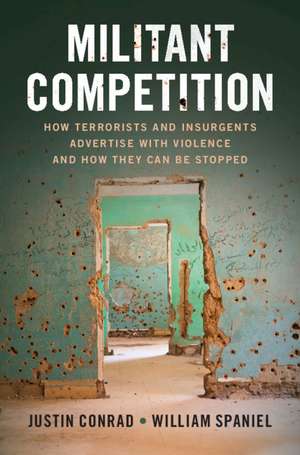Militant Competition: How Terrorists and Insurgents Advertise with Violence and How They Can Be Stopped
Autor Justin Conrad, William Spanielen Limba Engleză Paperback – 29 sep 2021
| Toate formatele și edițiile | Preț | Express |
|---|---|---|
| Paperback (1) | 285.75 lei 6-8 săpt. | |
| Cambridge University Press – 29 sep 2021 | 285.75 lei 6-8 săpt. | |
| Hardback (1) | 699.63 lei 6-8 săpt. | |
| Cambridge University Press – 29 sep 2021 | 699.63 lei 6-8 săpt. |
Preț: 285.75 lei
Nou
Puncte Express: 429
Preț estimativ în valută:
54.68€ • 57.09$ • 45.25£
54.68€ • 57.09$ • 45.25£
Carte tipărită la comandă
Livrare economică 04-18 aprilie
Preluare comenzi: 021 569.72.76
Specificații
ISBN-13: 9781108994538
ISBN-10: 1108994539
Pagini: 200
Ilustrații: 24 b/w illus. 4 tables
Dimensiuni: 150 x 230 x 16 mm
Greutate: 0.4 kg
Ediția:Nouă
Editura: Cambridge University Press
Colecția Cambridge University Press
Locul publicării:New York, United States
ISBN-10: 1108994539
Pagini: 200
Ilustrații: 24 b/w illus. 4 tables
Dimensiuni: 150 x 230 x 16 mm
Greutate: 0.4 kg
Ediția:Nouă
Editura: Cambridge University Press
Colecția Cambridge University Press
Locul publicării:New York, United States
Cuprins
1. Introduction; 2. A formal model of outbidding; 3. The evidence; 4. Outbidding, capacity, and government enforcement; 5. Outbidding as deterrence: endogenous demands in the shadow of group competition; 6. Cornering the market: counterterrorism in the shadow of group formation; Conclusion.
Recenzii
'With impeccable logic and notable inventiveness, the authors explore the dynamics of competition among militant groups. It's an added bonus that they also explain the often paradoxical effects of different state responses. They wisely advocate caution in the adoption of counterterrorism policies.' Martha Crenshaw, Stanford University
'This clear and compelling manuscript elaborates the strategic consequences of groups' incentives to produce violence for the purpose of advertising their worth to potential supporters. It centers the importance of competition, and in so doing makes it easy to see how competition drives interesting and sometimes counterintuitive results. Those results offer a strong caution for policy-makers who might otherwise expect one-size-fits-all solutions to the problem of militant violence.' David Siegel, Duke University
'While the concept of outbidding has been an important principle in understanding violent group escalation, Conrad and Spaniel move this discussion beyond the simple 'more groups equals more conflict' story. Using rigorous formal theory, connected empirical tests and important case analysis, Conrad and Spaniel show how the second-order effects of militant group competition can lead to unexpected outcomes. While this book will appeal to serious social scientists and scholars of political violence, Conrad and Spaniel address the critical policy implications of the novel theory and data analysis making the book applicable to the public, policymakers, and political scientists. I will assign it in my courses on political violence and terrorism at the undergraduate and graduate level. Joseph K. Young, American University
'This clear and compelling manuscript elaborates the strategic consequences of groups' incentives to produce violence for the purpose of advertising their worth to potential supporters. It centers the importance of competition, and in so doing makes it easy to see how competition drives interesting and sometimes counterintuitive results. Those results offer a strong caution for policy-makers who might otherwise expect one-size-fits-all solutions to the problem of militant violence.' David Siegel, Duke University
'While the concept of outbidding has been an important principle in understanding violent group escalation, Conrad and Spaniel move this discussion beyond the simple 'more groups equals more conflict' story. Using rigorous formal theory, connected empirical tests and important case analysis, Conrad and Spaniel show how the second-order effects of militant group competition can lead to unexpected outcomes. While this book will appeal to serious social scientists and scholars of political violence, Conrad and Spaniel address the critical policy implications of the novel theory and data analysis making the book applicable to the public, policymakers, and political scientists. I will assign it in my courses on political violence and terrorism at the undergraduate and graduate level. Joseph K. Young, American University
Notă biografică
Descriere
An examination of how competition between militant groups influences their behavior, and especially their use of violence.
